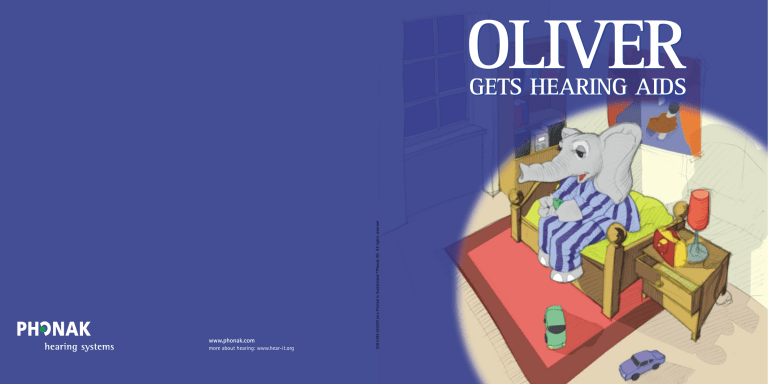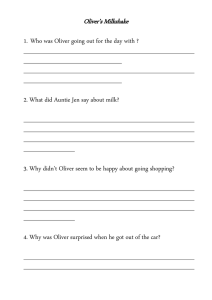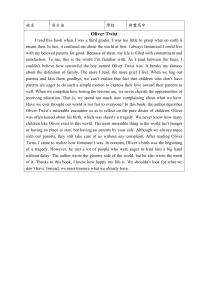
www.phonak.com
more about hearing: www.hear-it.org
028-0284-02/0701/wia Printed in Switzerland ©Phonak AG All rights reserved
OLIVER
GETS HEARING AIDS
"Oliver gets Hearing Aids" is dedicated to my brother, Patrick, who
is hearing impaired, and to the family, friends, and professionals
who were involved in helping him. It was Patrick's hearing and
speech professionals that shaped my career as a pediatric audiologist.
This book is written for children. I know from experience the need
for awareness and understanding that must be developed, not only by
children with hearing loss, but also by their peers. Additionally,
I hope that this book will reduce anxiety in those children first being
diagnosed with hearing loss and fit with hearing aids.
OLIVER
GETS HEARING AIDS
Maureen Cassidy Riski, M.Ed.
Knowing that education is the key to understanding, I believe that
the publication of this book will promote better understanding of the
challenges and importance of identifying and managing children with
hearing impairment. We wrote about "Oliver" to create a resource for
parents, teachers, and children who want to learn about the process
of hearing evaluation and habilitation.
Nikolas Klakow, M.S.
The authors would like to thank Dr. Rick Pillsbury, Dr. Amelia Drake,
and the staff of the Department of Otolaryngology, University of North Carolina
for the opportunities and support that they have provided.
Written by:
Maureen Cassidy Riski, Nikolas Klakow
Illustrated by:
Polygone, Nicolas Babey
Copyright © 2001. All rights reserved. No portion of this book may be reproduced, by any process or technique, without the express written consent of Phonak AG.
All the children
were playing and having fun,
except Oliver.
Oliver was sad
because he couldn’t quite
understand what his friends
were singing.
In school,
because Oliver
couldn’t hear
his teacher,
he often missed
the directions
she gave.
It was recess!
Oliver tried to play with
the other children, but
he couldn’t always hear
what they were saying
to him. So Oliver would
just be by himself.
Once again, Mrs. Brown,
Oliver’s teacher, had given him
a note to take to his mother.
When Oliver came home,
he gave the note to his mother,
and went to sit in front of
the TV.
Oliver liked
watching TV.
It was one of
the few things
he could make loud
enough for him
to understand.
His brother
and sister
thought the TV
was too loud!
“Who can I see for
help?" Mrs. Elephant
asked Dr. Young,
the family doctor.
“Oliver needs to see
an ear doctor,”
replied Dr. Young.
The next day
Oliver’s parents
picked him up
early from
school, and
they went to
the ear doctor.
The doctor’s waiting
room was full!
There was Tony who
had a sore throat,
and Samantha with
an earache...
“Oliver,” the nurse called.
It was Oliver’s turn to see
the doctor.
“Let’s see what we have here,”
Dr. Dog said, while looking
into Oliver’s ear. Oliver was
very brave, and let the doctor
look into his ear.
“You need to have your hearing
tested by the audiologist,”
said Dr. Dog.
“Hello,” said the audiologist,
as Oliver walked into the test booth.
“I’m going to test your hearing."
“Are you ready to play my
hearing game?" This is an easy
game, Oliver thought, as he threw
a block in a bucket each time
he heard a beeping sound.
“Good listening Oliver – look
at all those blocks!"
“Here are the results,”
the audiologist explained
to Oliver’s parents.
“He has a hearing loss
in both of his ears.
That is why he has
been having so much
trouble hearing.”
“Oliver needs
hearing aids,
so he will be able
to hear clearly,”
said the audiologist.
“He will need
earmolds to connect
the hearing aids
to his ears.”
SQUIRT...
the cold material
the audiologist put in
his ear was drying
quickly.
A couple of
weeks later
Oliver
returned to
the audiologist’s
office to try
on his new
hearing aids.
What a big day!
“You don’t need to shout!"
he told his parents when
they asked him if he liked
the hearing aids.
Oliver was surprised
at the songs coming
from the birds!
And the noisy cars!
There was so much
to hear.
It didn’t take
Oliver long to get
used to his new
hearing aids.
He liked being
able to hear
better.
Oliver liked
singing the most
and music class
soon became
his favorite.
“Here’s the ball!" shouted
Patrick the Rabbit, as he passed
the ball to Oliver.
“Great shot!" everyone yelled,
as Oliver made a goal.
Oliver was careful
with his hearing aids.
He learned how
to change the batteries
and at night he put them
in their special case.
He took good care of them
so they would last for
a long, long time.
Oliver was happy that he could hear better.
He lay in bed that night, dreaming.
His next birthday would be the best ever.
Speech and Hearing Checklist
This checklist outlines behaviors which may be expected of a child at various ages. If your child
consistently fails to respond as the checklist suggests, there may be a problem which requires
further evaluation. You should contact your local physician if you feel there is any cause for concern.
3-6 months
Children awaken or quiet to the sound of their
parents' voices. They typically turn their eyes
and their heads in the direction of a sound.
7-10 months
Children turn their heads and their shoulders
toward familiar sounds, even when they cannot
see what is happening. Sounds do not have to
be loud to cause them to respond.
11-15 months
Children show understanding of some words by
appropriate behavior. For example, they point to
or look at familiar objects, on request. They jabber in response to a voice, are apt to cry when
there is thunder, or may frown when scolded.
1 1/2 years
Some children begin to identify parts of the
body. They should be able to show their eyes or
toes and should be using a few single words.
The words are not complete or pronounced
perfectly but are clearly meaningful.
2 years
Children should be able to follow a few simple
commands without visual cues.
They should be using a variety of everyday
words heard at home. Most 2-year-olds enjoy
being read to and shown simple pictures in a
book and will point them out when asked.
2 1/2 years
Many children say or sing short rhymes or songs
and enjoy listening to music or singing.
If children have good hearing, and these events
bring them pleasure, they usually react to the
sound by running to look or telling someone
what they hear.
3 years
Children should be able to understand and use
some simple verbs, prepositions, adjectives, and
pronouns such as go, in, big, and me. They
should be able to locate the source of a sound.
They should be using complete sentences some
of the time.
4 years
Children should be able to give connected
accounts of some recent experiences.
They should be able to carry out a sequence of
two simple directions.
5 years
A child's speech should be intelligible, even
though some sounds may still be mispronounced.
Most children this age can carry on a conversation if the vocabulary is within their experience.
They should use pronouns correctly.
www.phonak.com
more about hearing: www.hear-it.org
028-0284-02/0701/wia Printed in Switzerland ©Phonak AG All rights reserved
OLIVER
GETS HEARING AIDS



